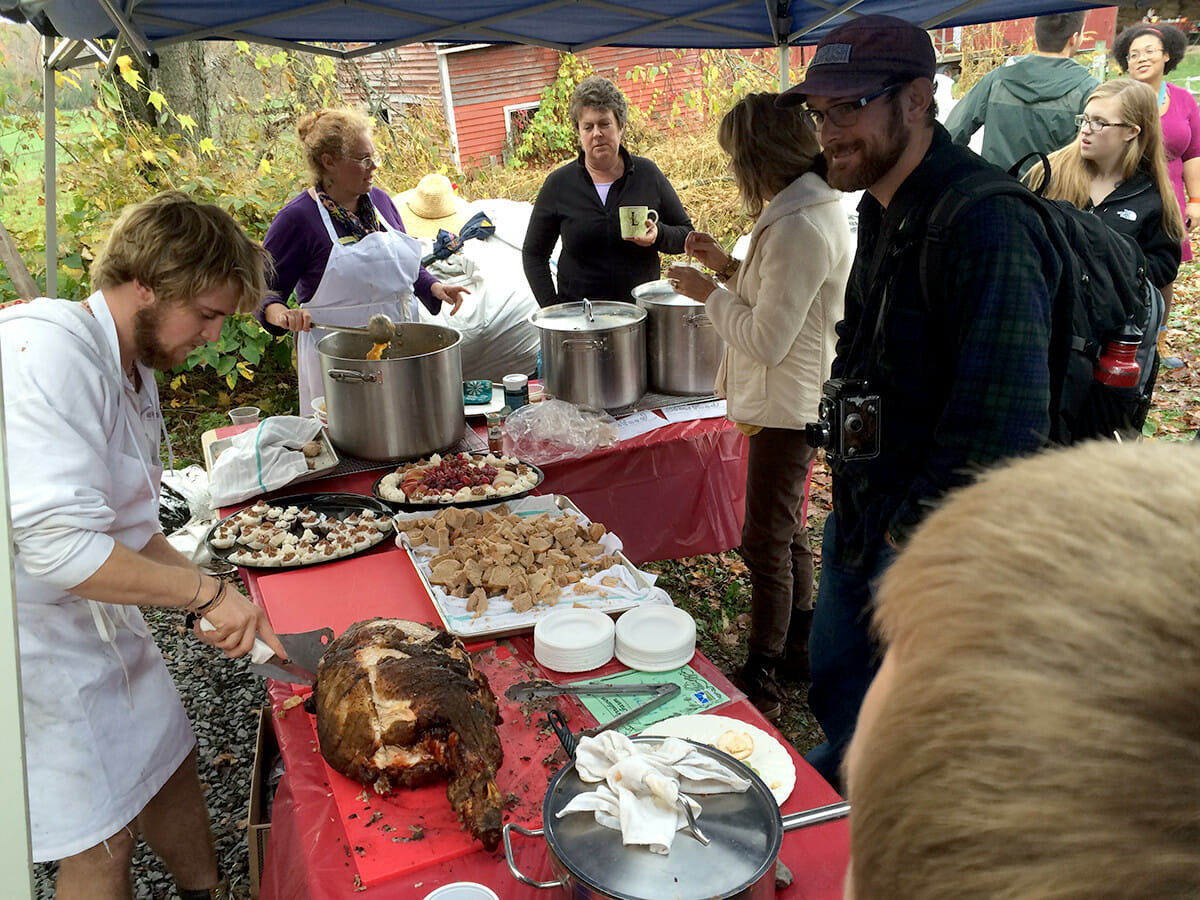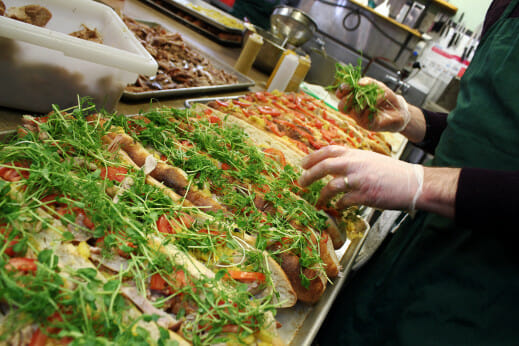Campus Dining Goes Local
College campuses are developing ambitious initiatives to source more food locally.
Campus Dining Goes Local
College campuses are developing ambitious initiatives to source more food locally.

Nonetheless, the awareness of where food comes from is experiencing an upswing among the college population, as countless campuses (including Skidmore College in Saratoga Springs, N.Y.; Kenyon College in Gambier, Ohio; and Warren Wilson College in Asheville, N.C., to name a few) have developed ambitious initiatives to source more food locally.
“Middlebury College has a longstanding commitment to sustainable dining,” says Dan Detora, executive director of food service operations at Middlebury College in Vermont. “We think using local foods is important because it provides us with the freshest possible ingredients for our students, and it supports local Vermont businesses and jobs.”
Sean Clark, an agriculture and natural resources professor at Berea College in Kentucky, says there was a time not so long ago when this mindfulness was nothing novel.
“When Berea College was founded in the 1800s, and carrying all the way up into the 1900s, most students came with some agricultural background, and they understood a lot more about where food came from and how it was produced,” says Clark. “Today, just like in the rest of the country, we have about 1 percent of the population farming, and very few of the students who come here have any background or understanding of production, post-production processing and the many steps in that food value chain that occur before it ends up on their plate.”
For some colleges that have implemented such projects, the food comes straight from farms operated on the campuses themselves, and college food waste is recirculated back into the system. Berea is one such college, with a 480-acre farm that employs about 45 students each year.
“Groups of interested faculty and staff thought it was odd to have a college farm that produced food … but none of that food ended up coming into dining halls where students ate,” says Clark. “In the late ’90s, people started asking questions as to why that is.”
The end of the 20th century also marked the turning point for Green Mountain College in Vermont, which at one time had three working farms, according to Philip Ackerman, who directs the school’s farm and food program as well as its master’s degree program in sustainable food systems.
“Local is nothing new to GMC … but our rural college got caught in the tidal wave of change that impacted most all colleges in the U.S., and we ended up essentially with a cut, open and pour kind of cuisine,” says Ackerman. “We set out to change that approach at about the same time that we decided to try and be the most sustainably focused college in the nation. Local food was seminal and central to those early efforts.”
The measures of these local food projects at higher education institutions range in ambitiousness, from featuring on-campus farm stands, to hiring full-time sustainability coordinators, to committing to increase local food purchases by certain percentages.
As of last year, Green Mountain sourced 36.9 percent of food locally. Berea currently stands at 20 percent, with an eventual goal of 50 percent. According to its website, Kenyon’s dining hall features 40 percent local food.

Middlebury recently committed to serving 30 percent “real food” by 2016 (defined as food grown locally within 150 miles; raised humanely; grown using ecologically sound practices and/or fair trade), a figure already far surpassed by Vermont neighbor Sterling College, which was ranked No. 1 in the country by the Real Food Challenge (the school serves 76 percent “real food,” 54 percent of which is local).
“We eat food from our own farm, as well as from local farmers, because we don’t just study sustainability and healthy food systems: we live it,” says Christian Feuerstein, director of communications at Sterling.
At Hampshire College in Massachusetts, an audacious target of eventually sourcing 100 percent of campus food locally is being aided by a $250,000 grant from the Henry P. Kendall Foundation.
“As we move forward with the college’s strategic plan, healthy food and sustainability are part and parcel of what we do here,” said Beth Hooker, Hampshire’s director of food, farm, and sustainability, in a prepared statement.
Local foods purchased by colleges run the gamut from produce, raw ingredients and condiments like syrup to locally raised meats and dairy products like beef, pork, yogurt and ice cream.
“In the end, local food is sort of the stone we threw in the pond, and now it’s reverberating and making waves in other sectors,” says Ackerman. “It’s opened our eyes, our hearts and our wallets, all at the same time.”
Follow us

This work is licensed under a Creative Commons Attribution-NoDerivatives 4.0 International License.
Want to republish a Modern Farmer story?
We are happy for Modern Farmer stories to be shared, and encourage you to republish our articles for your audience. When doing so, we ask that you follow these guidelines:
Please credit us and our writers
For the author byline, please use “Author Name, Modern Farmer.” At the top of our stories, if on the web, please include this text and link: “This story was originally published by Modern Farmer.”
Please make sure to include a link back to either our home page or the article URL.
At the bottom of the story, please include the following text:
“Modern Farmer is a nonprofit initiative dedicated to raising awareness and catalyzing action at the intersection of food, agriculture, and society. Read more at <link>Modern Farmer</link>.”
Use our widget
We’d like to be able to track our stories, so we ask that if you republish our content, you do so using our widget (located on the left hand side of the article). The HTML code has a built-in tracker that tells us the data and domain where the story was published, as well as view counts.
Check the image requirements
It’s your responsibility to confirm you're licensed to republish images in our articles. Some images, such as those from commercial providers, don't allow their images to be republished without permission or payment. Copyright terms are generally listed in the image caption and attribution. You are welcome to omit our images or substitute with your own. Charts and interactive graphics follow the same rules.
Don’t change too much. Or, ask us first.
Articles must be republished in their entirety. It’s okay to change references to time (“today” to “yesterday”) or location (“Iowa City, IA” to “here”). But please keep everything else the same.
If you feel strongly that a more material edit needs to be made, get in touch with us at [email protected]. We’re happy to discuss it with the original author, but we must have prior approval for changes before publication.
Special cases
Extracts. You may run the first few lines or paragraphs of the article and then say: “Read the full article at Modern Farmer” with a link back to the original article.
Quotes. You may quote authors provided you include a link back to the article URL.
Translations. These require writer approval. To inquire about translation of a Modern Farmer article, contact us at [email protected]
Signed consent / copyright release forms. These are not required, provided you are following these guidelines.
Print. Articles can be republished in print under these same rules, with the exception that you do not need to include the links.
Tag us
When sharing the story on social media, please tag us using the following: - Twitter (@ModFarm) - Facebook (@ModernFarmerMedia) - Instagram (@modfarm)
Use our content respectfully
Modern Farmer is a nonprofit and as such we share our content for free and in good faith in order to reach new audiences. Respectfully,
No selling ads against our stories. It’s okay to put our stories on pages with ads.
Don’t republish our material wholesale, or automatically; you need to select stories to be republished individually.
You have no rights to sell, license, syndicate, or otherwise represent yourself as the authorized owner of our material to any third parties. This means that you cannot actively publish or submit our work for syndication to third party platforms or apps like Apple News or Google News. We understand that publishers cannot fully control when certain third parties automatically summarize or crawl content from publishers’ own sites.
Keep in touch
We want to hear from you if you love Modern Farmer content, have a collaboration idea, or anything else to share. As a nonprofit outlet, we work in service of our community and are always open to comments, feedback, and ideas. Contact us at [email protected].by Lindsay Lennon, Modern Farmer
April 15, 2015
Modern Farmer Weekly
Solutions Hub
Innovations, ideas and inspiration. Actionable solutions for a resilient food system.
ExploreExplore other topics
Share With Us
We want to hear from Modern Farmer readers who have thoughtful commentary, actionable solutions, or helpful ideas to share.
SubmitNecessary cookies are absolutely essential for the website to function properly. This category only includes cookies that ensures basic functionalities and security features of the website. These cookies do not store any personal information.
Any cookies that may not be particularly necessary for the website to function and are used specifically to collect user personal data via analytics, ads, other embedded contents are termed as non-necessary cookies.